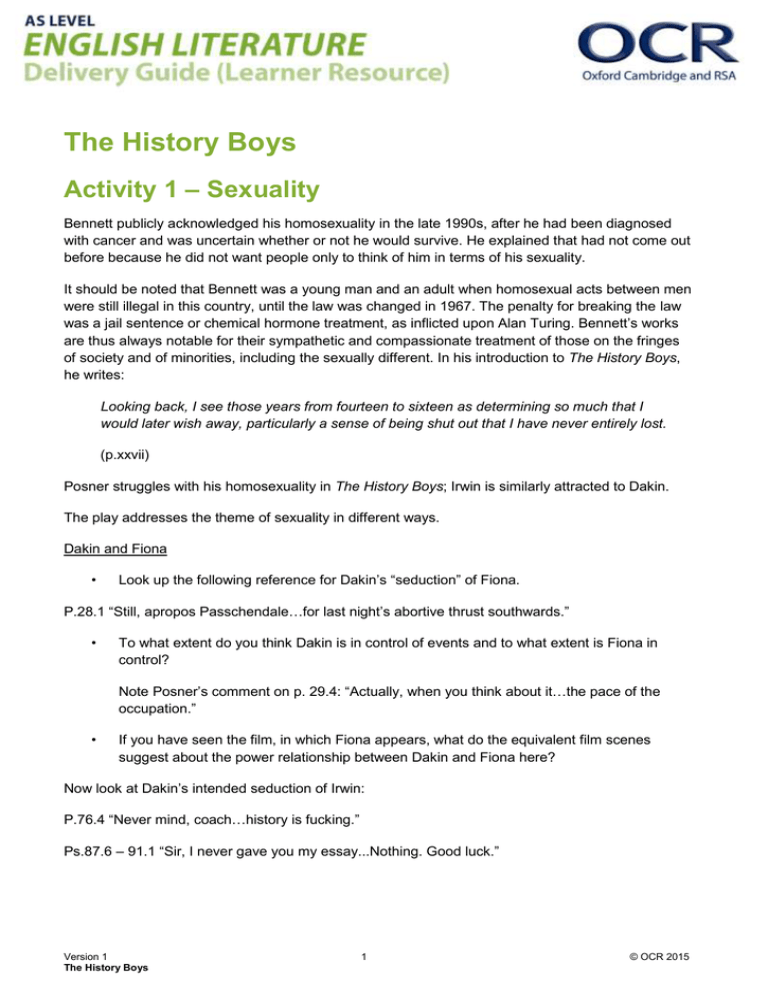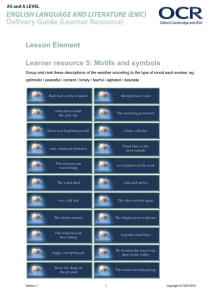
The History Boys
Activity 1 – Sexuality
Bennett publicly acknowledged his homosexuality in the late 1990s, after he had been diagnosed
with cancer and was uncertain whether or not he would survive. He explained that had not come out
before because he did not want people only to think of him in terms of his sexuality.
It should be noted that Bennett was a young man and an adult when homosexual acts between men
were still illegal in this country, until the law was changed in 1967. The penalty for breaking the law
was a jail sentence or chemical hormone treatment, as inflicted upon Alan Turing. Bennett’s works
are thus always notable for their sympathetic and compassionate treatment of those on the fringes
of society and of minorities, including the sexually different. In his introduction to The History Boys,
he writes:
Looking back, I see those years from fourteen to sixteen as determining so much that I
would later wish away, particularly a sense of being shut out that I have never entirely lost.
(p.xxvii)
Posner struggles with his homosexuality in The History Boys; Irwin is similarly attracted to Dakin.
The play addresses the theme of sexuality in different ways.
Dakin and Fiona
•
Look up the following reference for Dakin’s “seduction” of Fiona.
P.28.1 “Still, apropos Passchendale…for last night’s abortive thrust southwards.”
•
To what extent do you think Dakin is in control of events and to what extent is Fiona in
control?
Note Posner’s comment on p. 29.4: “Actually, when you think about it…the pace of the
occupation.”
•
If you have seen the film, in which Fiona appears, what do the equivalent film scenes
suggest about the power relationship between Dakin and Fiona here?
Now look at Dakin’s intended seduction of Irwin:
P.76.4 “Never mind, coach…history is fucking.”
Ps.87.6 – 91.1 “Sir, I never gave you my essay...Nothing. Good luck.”
Version 1
The History Boys
1
© OCR 2015
Ps 98.5-102.7 “In the room I stayed in…Same as you, probably. On my knees.”
See also p.61.4-62.8 “I didn't say anything about you and Dakin…Posner (appealing) Sir.”
•
How can we reconcile Dakin’s heterosexuality with his attempt to force a sexual encounter
on Irwin?
•
To what extent is Dakin’s sexual pursuit of Irwin concerned with: power, sexuality, affection,
friendship, bafflement?
Hector
Hector is married. He also gropes the boys on his motorbike at the end of their lessons. Some lazy
writing on the play says that Hector is a paedophile, something which always irritated Richard
Griffiths, who played Hector in the original production. Griffiths correctly pointed out that, since the
boys are all over sixteen (and presumably eighteen in most cases), Hector is not having sexual
relations with children and cannot be a paedophile. The boys themselves take his attentions
philosophically, as on p.17.6:
Scripps (resignedly) I'll come, sir.
Hector Ah, Scripps.
Hector goes.
Scripps The things I do for Jesus.
Hector’s groping is the forfeit (is “penalty” too strong a word?) the boys have to pay for his
wonderful, eccentric teaching.
It is, however, worth pointing out that in the late 1980s, when the play is set, homosexual acts
between men were only legal for those over 21. The age of consent for homosexual men was
lowered to 18 in 1994 (under John Major’s Conservative government) and to 16 in 2000 (under Tony
Blair’s Labour government). Hector’s sexual attentions to his students were thus illegal at the time of
the play. Furthermore, professional and quasi-legal guidelines in the 1980s insisted that it is an
offence for a person in a position of trust – a teacher, a lecturer, a counsellor and so on – to have a
sexual relationship with someone in his or her care. Dismissal was usually the minimal penalty for
someone breaching this rule. The Sexual Offences (Amendment) Act 2000 made it actually illegal to
engage in “sexual activity with a person under 18 if in a position of trust in relation to that person.”
•
How should an audience respond to Hector’s sexual attentions to the boys?
Note that Bennett clearly invites us to have a complex and ambivalent response.
Look at the following page references, in which characters talk about Hector’s predilection.
Discuss each moment, examining what it tells us about the theme and about the characters
and their attitudes.
Version 1
The History Boys
2
© OCR 2015
P.17.1 “Now, who goes home?..I tell you, be grateful.”
•
Write an overview about how we should respond to Hector’s sexuality. This should be
placed in the context of our overall response to his character in the play. Is he the hero?
OCR Resources: the small print
OCR’s resources are provided to support the teaching of OCR specifications, but in no way constitute an endorsed teaching method that is required by the Board, and the decision to
use them lies with the individual teacher. Whilst every effort is made to ensure the accuracy of the content, OCR cannot be held responsible for any errors or omissions within these
resources.
© OCR 2015 - This resource may be freely copied and distributed, as long as the OCR logo and this message remain intact and OCR is acknowledged as the originator of this work.
OCR acknowledges the use of the following content:
Please get in touch if you want to discuss the accessibility of resources we offer to support delivery of our qualifications: resources.feedback@ocr.org.uk
Version 1
The History Boys
3
© OCR 2015


